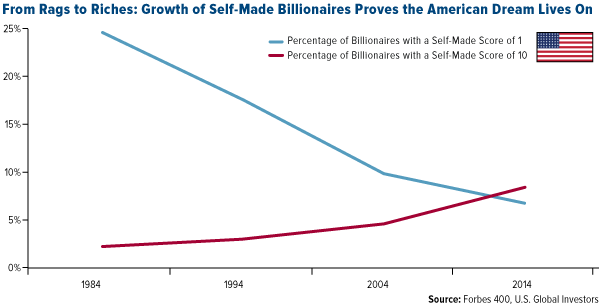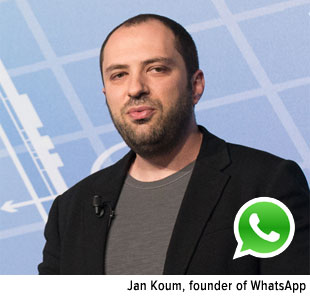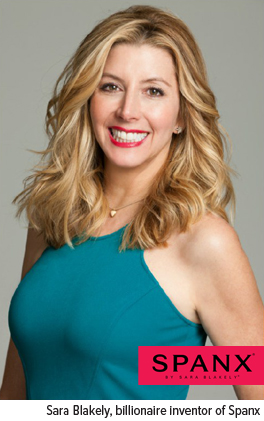Home Of The Free, Land Of The Entrepreneur
|
|
At 16, Jan Koum immigrated to the U.S. from his native Ukraine, then still under communist control. He and his single mother rented a small two-bedroom apartment on government assistance and relied on food stamps. Even though he didn’t own a computer at the time, Koum devoured computer networking manuals and became proficient at hacking, a skill that helped him land a job at Yahoo! in 1997.
But after nine years at the Internet company, Koum grew restless. He had other ideas and ambitions. Within a year of leaving Yahoo!, he developed a new instant messaging app for smartphones that he named WhatsApp. Its popularity took off, and Koum watched the valuation of his startup soar from $250,000 in 2009 to $1.5 billion in July 2013.
The following year—only five years after its launch—WhatsApp was acquired by social media titan Facebook for $16 billion plus $3 billion for the company’s founders. In a symbolic gesture, Koum signed the paperwork at the building that had once served as the welfare office where he received his food stamps. With the stroke of a pen, he became $6.8 billion richer. Today, WhatsApp is the top messaging app in the world, with 800 million monthly users, and Koum is number 208 on the Forbes 400 list of wealthiest Americans.
|
Home of the Free |
Koum’s story might sound like a plotline from the mind of Horatio Alger, the nineteenth-century American novelist whose works dramatize the rise of an impoverished young man to financial prominence. But American history is replete with such stories, starting with that of Benjamin Franklin. One of the Founders of the United States, Franklin helped guarantee that this country would be a place where people can freely pursue their dreams, innovate and capitalize on their achievements.
Much has changed since Franklin signed the Declaration of Independence nearly 240 years ago, but America still stands as a land of opportunity for U.S.-born citizens and immigrants alike.
Where else but in America can a startup such as Uber be valued at $50 billion, higher than 80 percent of the companies in the S&P 500 Index, only six years after its founding? Where else but in America can someone reach billionaire status by inventing a new type of hosiery, as Sara Blakely did with Spanx? Before her now-ubiquitous undergarments were worn by women—and now men—all over the globe, Blakely was so broke that she had to write her own patent without the help of an attorney.
As I pointed out in a Frank Talk early last month, nearly 70 percent of billionaires who show up in the Forbes 400 list are self-made. In fact, the percentage of those who have a self-made score of 10, meaning they created their wealth from nothing (think Jan Koum, Oprah Winfrey and George Soros), now exceeds the percentage of those with a score of 1, indicating they inherited every cent (Laurene Powell Jobs, widow of Apple-founder Steve Jobs).

Home of the Free
Regarding Apple, the tech giant represents just one of numerous American companies that were founded by either an immigrant or the child of an immigrant (Jobs’ biological father, still living, is Syrian). Recent examples include Sergey Brin, co-founder of Google, who emigrated from the U.S.S.R.; Elon Musk, CEO of Tesla Motors, originally from South Africa; and Yahoo! founder Jerry Yang, a Taiwanese émigré. According to the entrepreneurial research firm Kauffman Foundation, a quarter of all technology and engineering companies created in the U.S. between 2006 and 2010 were founded by foreign-born entrepreneurs. Amazingly, more than 40 percent of Fortune 500 companies were at least co-founded by immigrants or their children: AT&T, Budweiser, General Electric and IBM, among many more.
It’s doubtful that Jan Koum would have found the same level of success had he and his mother stayed in Ukraine. Fortunately for him, as well as the millions who regularly enjoy and benefit from his innovative service, the U.S. welcomed him in and allowed his talents to flourish.
I want to wish everyone a safe and happy Fourth of July, and to my friends and family in Canada, a happy Canada Day!
Disclosure: None.






Nice write up, and certainly can't argue your stats but...the folks you mention are the mythical beasts of one EXTREME and very remote corner of capitalism we mere mortals will never get near, whether we were born here or in a gulag.
Obviously these people are the exceptions! Were they put on Earth not to encourage us but to make us feel inadequate? Even for the graduates of prestige universities, the game has changed. And even they are being pulled under the underto of a shrinking job market.
The sad fact if right now there are a million internships and more than 3 million top tier students vying for one of the coveted spots.
The top one hundred companies offer 5% of all high-valued impossible to get positions so job seekers are under a great deal of pressure to seek gainful employment. And even though these are paid internships, most offer little more than "spending money."
Just getting a job at any level for most Americans, immigrant or native born, today is a dream…not a promise.And more and more, the dream of full employment is getting more and more elusive. Cheers, Carol